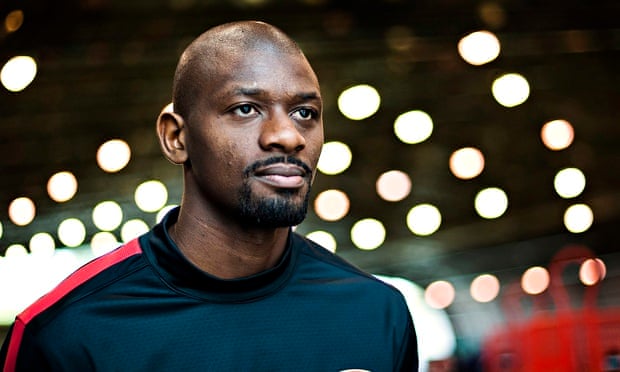 Abou Diaby is one of seven Arsenal players who did not make a Premier
League start before Christmas. Photograph: Tom Jenkins for the Guardian
Abou Diaby is one of seven Arsenal players who did not make a Premier
League start before Christmas. Photograph: Tom Jenkins for the Guardian
Watching the deceptive no-look pass, the driven volley and the general sparkle that invited acclaim for Tomas Rosicky over the weekend, what must have been going through the mind of his unluckiest team-mate? Abou Diaby, as with Rosicky not so long ago, lives in a cycle of seemingly endless rehabilitation wondering what will become of his football aspirations. The thought of expressing himself in a big game is something that must be painful as well as an imperative target to cling to.
Rosicky was 28, the same age as Diaby is now, when his career suddenly broke down. The Czech spent one and a half seasons out the game, the victim of an injury so baffling that nobody appeared to know exactly what was wrong or how to deal with it for months on end. Arsène Wenger gave evasive answers and Rosicky existed in some kind of footballing Bermuda Triangle.
The last couple of years for Diaby have been a virtual write-off. This season he has played only 67 minutes of a Capital One Cup tie. Last season he managed one 16-minute substitute appearance during the entire campaign. That is it. When he is not abroad in his persistent search for fitness he watches games at the Emirates, pops into the dressing room to see his team-mates but seldom gets close to the pitch.
Last week Wenger altered the generally positive tune he maintains when discussing Diaby. The Arsenal manager said he had “a decision to make” about the player’s future – a decision complicated by the fact he is not strong enough to take any part in practice on the training pitch. A couple of months previously Wenger had been much more encouraging, stating Diaby would be given a new contract if he was fully fit.
Lots of eyebrows went up in the room. Really? Of course the caveat – if he is fully fit – is a pretty unlikely one but it still appeared a remarkable show of faith in a player whose problems seem to be unending. He has managed a mere 22 appearances over the past four seasons.
As Arsenal were in shaky form at the time, the notion of a new deal for a player who has offered so little in recent years actually made a sector of the club’s support very cross: “How dare Wenger waste more salary funds and a valuable squad position on a crock!” Diaby’s name provokes a weird game of sporting scruples. The head says he cannot possibly be given a new deal. The heart – certainly from Wenger’s angle – wants to give him every chance.
Wenger’s reluctance to close the door on Diaby is admirable. It is a human response in a hard-nosed business. He desperately wants this boy to have a chance to become a version of the player he should have been – but for a horror challenge that threw everything off course eight years ago. Diaby’s career was jolted by a brutal tackle by Sunderland’s Dan Smith five months after joining Arsenal in 2006 – he was 20 then. He has never really recovered from that shattered ankle, despite numerous dedicated fitness campaigns since.
The manager has huge respect for the man as well as the player, having witnessed how much effort Diaby has put into trying to regain enough robustness to tie his boots competitively, again and again.
While weighing up what to do with Diaby, whose contract expires in the summer, there might be a part of Wenger that looks at Rosicky, remembers the mess he was in at the same age and hopes that some kind of miracle return from the wilderness of a long-term, complex, setback-ridden injury is possible. However, the practical part has to look at the probable.
Diaby’s situation does not fit comfortably with the current rules over squad numbers. Premier League regulations allow each club to select a maximum of 25 players, 17 of whom who are not classified as home-grown. Diaby uses up one of those valuable places. Wenger earmarked one of the defensive midfield slots for him this season, a position that has gnawed for years and become especially problematic in the absence of Mikel Arteta when they lost four out of nine league games at the beginning of winter – that was BC, before Coquelin, incidentally.
In terms of squad management, of Arsenal’s group of 25 Diaby was one of seven players who did not pick up a single Premier League start before Christmas. There were some experienced internationals in that group – Rosicky being one, Lukas Podolski, since offloaded to Internazionale, another. Joel Campbell, on his way to Villarreal, did not get a look-in. Theo Walcott and David Ospina were not available for a long stretch with injury. Then there was Francis Coquelin, diverted to Charlton as he was considered surplus to requirements. Altogether 28% of the named squad did not start a game for half a season, which obviously puts additional strain on the rest.
Of that seven some have returned to seize the moment and the manager’s attention. Rosicky, Walcott, Ospina and, most surprisingly of all, Coquelin have shown the intent to make their mark on the second half of the season. Two have been loaned to different leagues to play more football.
That just leaves Diaby, still in the footballing cold. Graciously and diligently, he continues working on those delicate limbs and muscles for the slim chance to play football.








0 comments:
Post a Comment